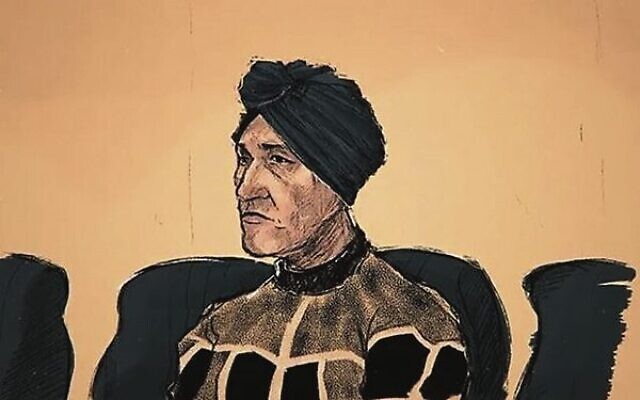Jury told complainants had ‘fallible memories’
Closing arguments by Malka Leifer's defence barrister started today, following the Crown Prosecutor's closing statements yesterday.

THE County Court of Victoria on Thursday heard closing arguments from Malka Leifer’s defence barrister, who told the jury that the three complainants against the former Adass Israel school principal had “fallible memories”.
Barrister Ian Hill said, “It’s on those fallible memories that you’re being asked to convict a person on serious criminal offences.”
The former Adass Israel school principal, a 56-year-old Israeli mother of eight, faces charges including rape, indecent assault and sexual penetration of a child aged 16 or 17 under her care or supervision.
She has pleaded not guilty to all charges relating to the three complainants, sisters Elly Sapper, Nicole Meyer and Dassi Erlich.
Leifer sat in court on Thursday, and the three complainants followed proceedings by a remote link from inside the court complex.
Noting that they must prove the charges against Leifer “beyond reasonable doubt”, Hill urged the jury “to use your common sense and your experience of life” to assess “the effect, particularly over time, of imagination, emotion, prejudice and suggestion, on the capacity of a person to truly remember”.
Hill said evidence given by Erlich’s former husband Joshua Erlich “explains in part how this unfortunate narrative of these three sisters commenced, perhaps from innocent beginnings, and from remarks taken out of all proportion, which grew like wildfire into a story that was constantly added to and varied over the years, and where truth and reliability were lost in false accounts, and hardened into false imaginations” relating to “sexual assault and rape”.
He said Joshua Erlich’s testimony – that in 2008 he overheard his wife discussing Meyer’s session with social worker Chana Rabinowitz and that Dassi “doesn’t understand why Rabinowitz is making a big deal out of it” – is “pretty telling.”
Stating that Joshua Erlich had related how Leifer “would rub her, Hadassah [Dassi], on the thigh in an affectionate way”, Hill said, “Whatever was happening in that household, the family household of the Sappers, touch seems to have been thought strangely of by these three complainants. They were each uncomfortable with touch.”
Hill said evidence that Nechama (Nicole) Meyer told psychiatrist Dr Natalie Krapivensky in 2014 there had been no digital penetration of her contradicts some of the allegations relating to the charges against his client.
He said Dassi Erlich and Meyer were “planning and plotting to harass Mrs Leifer and laughing about it”.
The barrister said evidence provided by Rabinowitz, and by social workers Dr Vicki Gordon and Professor Lorainne Dennerstein, who had respectively counselled Erlich, Sapper and Meyer, was in each case unsupported by any surviving notes of the sessions.
Disputing how sheltered the lifestyle of the complainants had been, Hill said students “were not completely isolated” and there were reports they had access to books outside the Adass school’s sphere.
Crown Prosecutor Justin Lewis on Wednesday summarised in graphic detail the 27 charges against Leifer, relating to acts allegedly committed against the three complainants, including digital penetration of all three of the girls.
Lewis noted there were no other witnesses to any of the alleged acts as they had occurred away “from prying eyes”
He said the nature of the evidence disproves any collusion between the complainants, a scenario raised by Leifer’s barrister.
The alleged acts had occurred in a number of places, including Leifer’s home, the Adass school office and library, a camp, and an overnight school trip, the prosecutor stated.
Noting each complainant was cross-examined for days, on events dating back many years, Lewis advised the jury to anticipate Leifer’s defence counsel telling them that because there have been changes in the complainants’ testimony and “as a result of a number of matters raised in cross-examination, you should reject their allegations”.
“Witnesses are human beings … they are not computers or video recorders. I’m sure that is not news to you. I’m sure you can all think of examples from your own lives in relation to the quirks of memory ,” he told the jury.
“I suggest that nothing in any of that, once understood properly, provides any reason for you to not accept their evidence in relation to the charged acts,” he said.
Completing his closing argument to the jury on Thursday, Lewis stated, “May I suggest to you that collusion is not a feasible explanation of the allegations that you have before you … if there was collusion … you would actually expect that evidence to match up almost precisely … the product of design. Instead what you find are a number of differences.”
The prosecutor said that Leifer “groomed and sexually abused” the complainants.
Leifer had been “a respected member of their community and was in a position of authority that she was fully prepared to exploit.
“She knew that [the complainants] were vulnerable and she used that knowledge to exploit them. Knowing that they were neglected at home, she pretended that she loved them and told them that she was helping them.
“She manipulated their emotions while abusing them for her own sexual gratification,” said Lewis.
“And she was able to conceal what she was doing for years due to that manipulation.
“Members of the jury, you have more than enough evidence to convict the accused on the charges before you on the indictment, and I ask you to do so,” he said.
The trial continues, with Hill due to continue his summation on Tuesday. The jury will start their deliberations shortly after.

comments